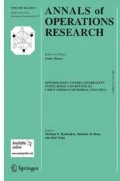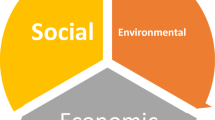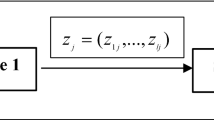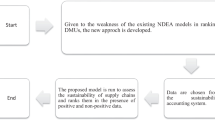Abstract
Incorporating sustainable decisions with the retailer’s operational management has attracted enormous significance due to government regulations and customer demand for environmental consciousness. However, incorporating sustainable operations may interfere with the operational performance of the firm and, hence, retail companies need to examine the influence of these operations on overall supply chain efficiency. The present study develops a performance measurement model based on a two-stage network data envelopment analysis (DEA) technique for measuring the joint impact of sustainable operations and operational activities on the business performance of a retail company. A case study of an Indian electronic retail chain is presented to reveal the potentiality and suitability of the proposed models. The novelty of the paper lies in establishing DEA models for an Indian retail chain company and for providing an analytical understanding of the conditions under which the strategic decisions at the operational level successfully support the integration of sustainable operations into the SC management. The results show that the additional sustainable constraints lead to improved operational efficiency of some firms of the retail chain and result in improved business efficiency, while for other firms the integration of sustainable objectives decrease business efficiency. The significance of the study lies in providing efficient target conditions for inefficient retail stores to improve their performance. The findings of the study provide meaningful insights to Indian retailers venturing into sustainable retailing operations for enhancing the operational and business efficiency of the supply chain.










Similar content being viewed by others
References
Álvarez-Rodríguez, C., Martín-Gamboa, M., & Iribarren, D. (2019a). Combined use of data envelopment analysis and life cycle assessment for operational and environmental benchmarking in the service sector: A case study of grocery stores. Science of the Total Environment, 667, 799–808
Álvarez-Rodríguez, C., Martín-Gamboa, M., & Iribarren, D. (2019b). Sustainability-oriented management of retail stores through the combination of life cycle assessment and dynamic data envelopment analysis. Science of the Total Environment, 683, 49–60
Álvarez-Rodríguez, C., Martín-Gamboa, M., & Iribarren, D. (2020). Sensitivity of operational and environmental benchmarks of retail stores to decision-makers’ preferences through data envelopment analysis. Science of the Total Environment, 718, 137330
Andersen, P., & Petersen, N. C. (1993). A procedure for ranking efficient units in data envelopment analysis. Management Science, 39(10), 1261–1264
Balios, D., Eriotis, N., Fragoudaki, A., & Giokas, D. (2015). Economic efficiency of Greek retail SMEs in a period of high fluctuations in economic activity: A DEA approach. Applied Economics, 47(33), 3577–3593
Banker, R. D., Charnes, A., & Cooper, W. W. (1984). Some models for estimating technical and scale inefficiencies in data envelopment analysis. Management Science, 30(9), 1078–1092
Charnes, A., Cooper, W. W., Golany, B., Seiford, L., & Stutz, J. (1985). Foundations of data envelopment analysis for Pareto-Koopmans efficient empirical production functions. Journal of Econometrics, 30(1–2), 91–107
Charnes, A., Cooper, W. W., & Rhodes, E. (1978). Measuring the efficiency of decision making units. European Journal of Operational Research, 2(6), 429–444
Chen, Y., Cook, W. D., Li, N., & Zhu, J. (2009). Additive efficiency decomposition in two-stage DEA. European Journal of Operational Research, 196(3), 1170–1176
Chen, Z.-S., Zhang, X., Govindan, K., Wang, X.-J., & Chin, K.-S. (2021). Third-party reverse logistics provider selection: A computational semantic analysis-based multi-perspective multi-attribute decision-making approach. Expert Systems with Applications. https://doi.org/10.1016/j.eswa.2020.114051
Claro, D. P., Neto, S. A. L., & de Oliveira Claro, P. B. (2013). Sustainability drivers in food retail. Journal of Retailing and Consumer Services, 20(3), 365–371
Cook, W. D., & Seiford, L. M. (2009). Data envelopment analysis (DEA)—Thirty years on. European Journal of Operational Research, 192(1), 1–17
Corbett, C. J., & Klassen, R. D. (2006). Extending the horizons: Environmental excellence as key to improving operations. Manufacturing & Service Operations Management, 8(1), 5–22
Donthu, N., & Yoo, B. (1998). Retail productivity assessment using data envelopment analysis. Journal of Retailing, 74(1), 89–105
Duman, G. M., Tozanli, O., Kongar, E., & Gupta, S. M. (2017). A holistic approach for performance evaluation using quantitative and qualitative data: a food industry case study. Expert Systems with Applications, 81, 410–422
Dyson, R. G., & Thanassoulis, E. (1988). Reducing weight flexibility in data envelopment analysis. Journal of the Operational Research Society, 39(6), 563–576
Erol, I., Cakar, N., Erel, D., & Sari, R. (2009). Sustainability in the Turkish retailing industry. Sustainable Development, 17(1), 49–67
Fatimah, Y. A., Govindan, K., Murniningsih, R., & Setiawan, A. (2020). Industry 4.0 based sustainable circular economy approach for smart waste management system to achieve sustainable development goals: A case study of Indonesia. Journal of Cleaner Production, 269, 122263
Ferreira, A., Pinheiro, M. D., de Brito, J., & Mateus, R. (2019). Decarbonizing strategies of the retail sector following the Paris Agreement. Energy Policy, 135, 110999
Fraj, E., Martínez, E., & Matute, J. (2011). Green marketing strategy and the firm’s performance: The moderating role of environmental culture. Journal of Strategic Marketing, 19(4), 339–355
Gandhi, A., & Shankar, R. (2014). Efficiency measurement of Indian retailers using data envelopment analysis. International Journal of Retail & Distribution Management, 42(6), 500–520
Ghiyasi, M. (2019). Full ranking of efficient and inefficient DMUs with the same measure of efficiency in DEA. International Journal of Business Performance and Supply Chain Modelling, 10(3), 236–252
Gong, Y., Liu, J., & Zhu, J. (2019). When to increase firms’ sustainable operations for efficiency? A data envelopment analysis in the retailing industry. European Journal of Operational Research, 277(3), 1010–1026
Govindan, K., Kilic, M., Uyar, A., & Karaman, A. S. (2021). Drivers and value-relevance of CSR performance in the logistics sector: A cross-country firm-level investigation. International Journal of Production Economics, 231, 107835
Goworek, H. (2011). Social and environmental sustainability in the clothing industry: A case study of a fair trade retailer. Social Responsibility Journal, 7(1), 74–86
Gupta, A., & Mittal, S. (2010). Measuring retail productivity of food and grocery retail outlets using the DEA technique. Journal of Strategic Marketing, 18(4), 277–289
Gupta, A., Pachar, N., Jha, P. C., & Darbari, J. D. (2019). Efficiency assessment of Indian electronics retail stores using DEA. International Journal of Business Performance and Supply Chain Modelling, 10(4), 386–414
Halley, A., & Beaulieu, M. (2009). Mastery of operational competencies in the context of supply chain management. Supply Chain Management: An International Journal, 14(1), 49–63
Hampl, N., & Loock, M. (2013). Sustainable development in retailing: What is the impact on store choice? Business Strategy and the Environment, 22(3), 202–216
Hendiani, S., Sharifi, E., Bagherpour, M., & Ghannadpour, S. F. (2019). A multi-criteria sustainability assessment approach for energy systems using sustainability triple bottom line attributes and linguistic preferences. Environment, Development and Sustainability, 22, 1–35
Jones, P., Comfort, D., Hillier, D., & Eastwood, I. (2005). Retailers and sustainable development in the UK. International Journal of Retail & Distribution Management, 33(3), 207–214
Jouzdani, J., & Govindan, K. (2021). On the sustainable perishable food supply chain network design: A dairy products case to achieve sustainable development goals. Journal of Cleaner Production, 278, 123060
Kannan, D. (2021). Sustainable procurement drivers for extended multi-tier context: A multi-theoretical perspective in the Danish supply chain. Transportation Research Part E: Logistics and Transportation Review, 146, 102092
Kannan, D., Mina, H., Nosrati-Abarghooee, S., & Khosrojerdi, G. (2020). Sustainable circular supplier selection: A novel hybrid approach. The Science of the Total Environment, 722, 137936
Kannan, D., Moazzeni, S., Mostafayi Darmian, S., & Afrasiabi, A. (2021). A hybrid approach based on MCDM methods and Monte Carlo simulation for sustainable evaluation of potential solar sites in east of Iran. Journal of Cleaner Production, 279, 122368
Keh, H. T., & Chu, S. (2003). Retail productivity and scale economies at the firm level: A DEA approach. Omega, 31(2), 75–82
Ko, K., Chang, M., Bae, E. S., & Kim, D. (2017). Efficiency analysis of retail chain stores in Korea. Sustainability, 9(9), 1629
Lau, K. H. (2013). Measuring distribution efficiency of a retail network through data envelopment analysis. International Journal of Production Economics, 146(2), 598–611
Lehner, M. (2015). Translating sustainability: The role of the retail store. International Journal of Retail & Distribution Management, 43(4–5), 386–402
Li, Z., Tang, D., Han, M., & Bethel, B. J. (2018). Comprehensive evaluation of regional sustainable development based on data envelopment analysis. Sustainability, 10(11), 3897
Lukić, R. (2012). Sustainable development of retail in Serbia. Revista de Management Comparat Internațional, 13(4), 574–586
Mina Kannan, D., Gholami-Zanjani, S. M., & Biuki, M. H. (2021). Transition towards circular supplier selection in petrochemical industry: A hybrid approach to achieve sustainable development goals. Journal of Cleaner Production, 286, 125273
Naidoo, M., & Gasparatos, A. (2018). Corporate environmental sustainability in the retail sector: Drivers, strategies and performance measurement. Journal of Cleaner Production, 203, 125–142
Pande, S., & Patel, G. N. (2013). Assessing cost efficiency of pharmacy retail stores and identification of efficiency drivers. International Journal of Business Performance Management, 14(4), 368–385
Rashidi, K., & Cullinane, K. (2019). Evaluating the sustainability of national logistics performance using data envelopment analysis. Transport Policy, 74, 35–46
Ruiz-Real, J. L., Uribe-Toril, J., Gázquez-Abad, J. C., & de Pablo Valenciano, J. (2019). Sustainability and retail: Analysis of global research. Sustainability, 11(1), 14
Saaty, T. L. (1990). How to make a decision: The analytic hierarchy process. European Journal of Operational Research, 48(1), 9–26
Saha, S., Nielsen, I., & Moon, I. (2017). Optimal retailer investments in green operations and preservation technology for deteriorating items. Journal of Cleaner Production, 140, 1514–1527
Schweikert, A., Espinet, X., & Chinowsky, P. (2018). The triple bottom line: Bringing a sustainability framework to prioritize climate change investments for infrastructure planning. Sustainability Science, 13(2), 377–391
Seiford, L. M., & Zhu, J. (1999). Profitability and marketability of the top 55 US commercial banks. Management Science, 45(9), 1270–1288
Sexton, T. R., Silkman, R. H., & Hogan, A. J. (1986). Data envelopment analysis: Critique and extensions. New Directions for Program Evaluation, 1986(32), 73–105
Sharma, A., Iyer, G. R., Mehrotra, A., & Krishnan, R. (2010). Sustainability and business-to-business marketing: A framework and implications. Industrial Marketing Management, 39(2), 330–341
Sivagnanasundaram, M. (2018). Sustainability practices in Indian Retail Industry: A comparison with top global retailers. Emerging Economy Studies, 4(1), 102–111
Sodhi, H. S., Singh, D., & Singh, B. J. (2020). SWOT analysis of waste management techniques quantitatively. International Journal of Advanced Operations Management, 12(2), 103–121
Song, M., Peng, J., Wang, J., & Dong, L. (2018). Better resource management: An improved resource and environmental efficiency evaluation approach that considers undesirable outputs. Resources, Conservation and Recycling, 128, 197–205
Tang, A. K., Lai, K. H., & Cheng, T. C. E. (2016). A multi-research-method approach to studying environmental sustainability in retail operations. International Journal of Production Economics, 171, 394–404
Uyar, A., Bayyurt, N., Dilber, M., & Karaca, V. (2013). Evaluating operational efficiency of a bookshop chain in Turkey and identifying efficiency drivers. International Journal of Retail & Distribution Management., 41(5), 331–347
Wanke, P., Blackburn, V., & Barros, C. P. (2016). Cost and learning efficiency drivers in Australian schools: A two-stage network DEA approach. Applied Economics, 48(38), 3577–3604
Wu, D. D. (2010). Bilevel programming data envelopment analysis with constrained resource. European Journal of Operational Research, 207(2), 856–864
Xavier, J. M., Moutinho, V. F., & Moreira, A. C. (2015). An empirical examination of performance in the clothing retailing industry: A case study. Journal of Retailing and Consumer Services, 25, 96–105
Yang, G. L., Fukuyama, H., & Chen, K. (2019). Investigating the regional sustainable performance of the Chinese real estate industry: A slack-based DEA approach. Omega, 84, 141–159
Youn, C., Kim, S. Y., Lee, Y., Choo, H. J., Jang, S., & Jang, J. I. (2017). Measuring retailers’ sustainable development. Business Strategy and the Environment, 26(3), 385–398
Yu, W., & Ramanathan, R. (2009). An assessment of operational efficiency of retail firms in China. Journal of Retailing and Consumer Services, 16(2), 109–122
Zhan, J., Zhang, F., Li, Z., Zhang, Y., & Qi, W. (2020). Evaluation of food security based on DEA method: A case study of Heihe River Basin. Annals of Operations Research, 290(1), 697–706
Zhang, X., van Donk, D. P., & van Der Vaart, T. (2011). Does ICT influence supply chain management and performance? International Journal of Operations & Production Management, 31(11), 1215–1247
Zhang, Y. (2015). Designing a retail store network with strategic pricing in a competitive environment. International Journal of Production Economics, 159, 265–273
Zhu, J. (2014). Quantitative models for performance evaluation and benchmarking: data envelopment analysis with spreadsheets (Vol. 213). Springer.
Author information
Authors and Affiliations
Corresponding author
Additional information
Publisher's Note
Springer Nature remains neutral with regard to jurisdictional claims in published maps and institutional affiliations.
Rights and permissions
About this article
Cite this article
Pachar, N., Darbari, J.D., Govindan, K. et al. Sustainable performance measurement of Indian retail chain using two-stage network DEA. Ann Oper Res 315, 1477–1515 (2022). https://doi.org/10.1007/s10479-021-04088-y
Accepted:
Published:
Issue Date:
DOI: https://doi.org/10.1007/s10479-021-04088-y




